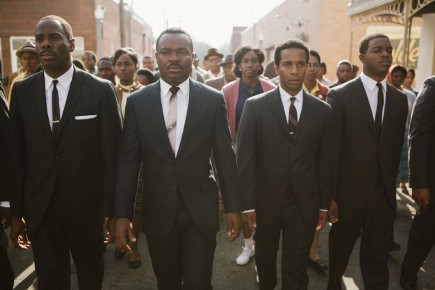“Everything that we see is a shadow cast by that which we do not see.” – Martin Luther King
It’s 2015, the Oscar nominations have been thrown out to the wild, and in retort to an irritated social media response, the Academy President Cheryl Boone Isaacs issued the following statement to calm a growing sentiment arising over inequalities: “In the last two years, we’ve made greater strides than we ever have in the past towards becoming a more diverse and inclusion organization through admitting new members and more inclusive classes of members.”
This is what the oxymoron of progress would sound like in words. Consider that this statement comes in the face of Selma, a film that was nominated for best picture about a movement led by the iconic Martin Luther King, who strived to secure equal voting rights in Selma Montgomery, Alabama in 1965. It’s the sort of quote by Boone that serves to strengthen the myth of a “post-racial system.” It removes the urge to question obvious disparities, halting a desire to make a change, while simultaneously empowering the ridiculous suggestion that’s heard from the mouths of the privileged everywhere: “This isn’t about race.” It would be insulting to make any sort of comparisons between this matter and a march that involved beatings and murder for equality; that’s not my aim. Nonetheless, it is ironic when you consider what people are actually angry for. Is the film industry really equal when it comes to voting for its minority peers?
It’s easy to voice a blanket statement that pulls the wool over the eyes of those who are comfortable with the status quo. An easy “no” can suffice. Sure, maybe there’s no “real” problem that exists within a panel of judges. They just happen to be the same voices that have the power to determine what art form deserves renowned praise. Their decisions can ultimately determine what trends need to be enacted to warrant such honours.
Take one quote from Sony’s recent hack for instance, in response to how the world views black leads: “I believe that the international motion-picture audience is racist – in general, pictures with an African-American lead don’t play well overseas,” wrote one producer. “But Sony sometimes seems to disregard that a picture must work well internationally both to maximize returns and reduce risk, especially pics with decent sized budgets.”
It was as if the Academy realized just how off-coloured everything looked on paper, so a last minute gesture in the voting process was made to appease the masses.
Awards bring praise, and praise attracts money, and the promise of money can influence a generation of choices. Remember that these same influential opinions come from a group of Academy voters that are approximately 94 per cent white, 77 per cent male, and a mere 14 per cent under the age of 50, according to a 2012 survey by The Los Angeles Times.
It’s plain as day to see what’s wrong with this picture.
American Sniper, Birdman, Boyhood, The Grand Budapest Hotel, The Imitation Game, The Theory of Everything, Whiplash and Selma were all nominated for best picture. Of all the selections, it was only Selma that received no further nominations attached to its name. Forget supporting actress or actor, or a nod for a leading role, or perhaps even an opportunity to nominate the first black director in Ava DuVernay – just best ol’ picture. This is doubly ridiculous when you consider that Foxcatcher’s Richard Linklater was nominated as best director, despite the film not getting a nod in the overall film category. It was as if the Academy realized just how off-coloured everything looked on paper, so a last minute gesture in the voting process was made to appease the masses. Let’s also not forget that Selma would have to go against the favourite, Boyhood, which took 12 years to film (an automatic win by Academy standards).
We ought to demand that our traditions and voice be the ones that also have the power to decide, rather than assimilating our identities in order to be recognized by an empowered few.
Cheryl Boone, who is the Academy’s first black female president, needs to be “real” about the realities of this system and the film industry as a whole. Quite often, you’re lucky to find a black-centric filmed nominated for anything, and in light of that, it’s judged all the more strictly against a tradition of film that speaks to a 94 per cent white audience. Chris Rock made a wonderful comparison when he wrote in The Hollywood Reporter of Kevin Hart’s success and his unfair need to crossover in order to find a certain level of achievement, something that a privileged Jon Stewart would never have to do, because despite his lesser numbers, his numbers consist of an audience that actually matters in the industry: white males.
In an effort to gain that same equality, it’s important that members of the black and minority industry adopt and retain their own values and vision. We ought to demand that our traditions and voice be the ones that also have the power to decide, rather than assimilating our identities in order to be recognized by an empowered few. By that same token, we should never be so unaware of what’s going on, that we allow someone like Cheryl Boone to suggest to us that this isn’t a problem.
Words By. Noel Ransome + Photos Courtesy Of. Atsushi Nishijima (© 2014 Paramount Pictures)





Comments are closed.